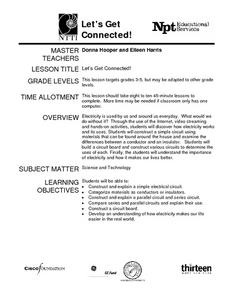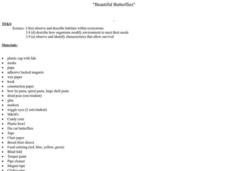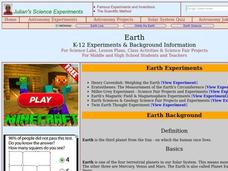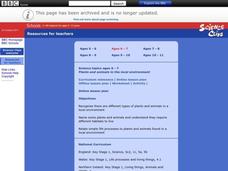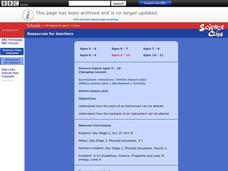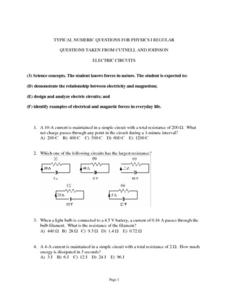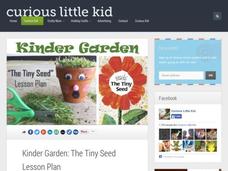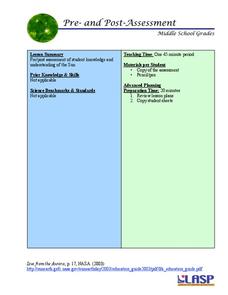Curated OER
Let's Get Connected!
A great activity introduces your youngsters to electricity. They use internet links, streaming video, and engage in hands-on activities to understand what electricity is and how it works. They build a circuit board, and construct a...
Curated OER
Beautiful Butterflies
Third graders study the life cycle of the butterfly through this series of activities. They create projects, play games, and observe butterfly characteristic that contribute to their survival.
Curated OER
Earth
Students study the earth in relation to the solar system. In this planetary lesson plan students complete several investigations into the measurement of the earth and its magnetic field.
Curated OER
Biodiversity
Students explore the biodiversity of the national marine sanctuaries. In this science lesson, students view a video about Cordell Bank National Marine Sanctuary and Hawaiian Islands Humpback Whale National Marine Sanctuary. Students work...
Curated OER
Under The Sea
In this resource instructional activity, learners use non-fiction books to research ocean animals. Students discover the many features of non-fiction books and how to use these features to help them conduct research. Learners then...
Curated OER
Plants and Animals in the Local Environment
Students recognize the different types of plants and animals living in a local environment. They determine how they require different habitats to live, and relate simple life processes to plants and animals found in local environments.
Curated OER
Changing Sounds
Students identify how the pitch and the loudness of an instrument can be altered. In this online science of sound instructional activity, students employ the use of an interactive whiteboard to examine the loudness and pitch of a guitar,...
Curated OER
Changing State
Students investigate the cooling and heating of water. In this online science experiment lesson, students work in groups to make predictions regarding freezing and boiling points and then test those predictions as they complete the...
Curated OER
How We See Things
Students explain that when a beam of light is reflected from its surface, it changes direction. In this virtual science experiment lesson plan, students complete an activity that requires them to investigate how flat mirrors reflect...
Curated OER
Characteristics of Materials
Students describe and compare common properties of various classroom materials. In this science/matter lesson, students observe common classroom items and the materials they are made of to complete a list of common properties.
Curated OER
Analyze Your Sand Samples
In this sand sample worksheet, students analyze a sample of sand and indicate the site the sand was from, the size of major and minor particles, the presence of shells and magnetic particles, the colors present and the shapes of the sand.
Curated OER
Understanding Power using Kirchhoff’s Rules
Twelfth graders cite real life applications of Kirchhoff's rules. In this physics lesson, 12th graders calculate current, power and voltage using Kirchhoff and Ohm's laws. They explain the different components and uses of transformers.
Curated OER
The History of Life
In this extinction worksheet, high schoolers review how species evolve and how species go extinct. Students compare and contrast gradualism and punctuated equilibrium. This worksheet has 6 fill in the blank and 4 short answer questions.
BBC
Ourselves
Young biologists identify parts of the body, sort humans from other animals, and list the difference they see. Learners are split up into groups of three, and each group must find pictures in magazines of humans and other animals. They...
Curated OER
Typical Numeric Questions for Physics I - Electric Circuits
A collection of 15 practice problems, most of them involving circuit schematics, is provided for your physics class on this handout. Learners are to compute the net charge, resistance, energy, or power dissipated for different...
University of Hawaiʻi
Taxonomy and Me!
Taxonomy is the study of organisms and how you phylum. Three biology activities are included, helping scholars understand four of the six kingdoms, specifically Protista, Plantae, Fungi, and Animalia. Scholars observe and classify in...
BBC
Sound and Hearing
First and second graders recognize that sound is generated in a variety of ways, and that it comes from many different sources. They explore tone and volume, realizing that there are different ways to describe sound. Some musical...
BBC
Light and Shadows
Light is such an amazing thing! Elementary schoolers explore the wonderful world of light and shadow. The lesson is meant to be carried out on a whiteboard. Objects are placed in front of a light source, and learners must predict what...
Space Awareness
Meet Our Neighbors: Sun
The sun isn't just a ball of yellow! Young scientists learn about the features of the sun using a hands-on modeling activity. They build models of the sun using common household items to represent sunspots, solar prominence, and the...
Freecloud Design
Monster Physics™
Physics fanatics will shriek over this monster-themed construction application! They design an invention with the intention of competing one of 50 missions and test it out with real physics applications.
It's About Time
The Sun and Its Effects on Your Community
Why is the sun round? Examine this question, and others, with your pupils while teaching them how to live in a more earth-friendly environment. Pupils explore Sun composition and discuss how solar wind, sunspots, and solar energy affects...
National Institute of Open Schooling
Occurrence and Extraction of Metals
Steel is a man-made alloy or a mixture of metals. Lesson 18 in this series of 36 focuses on metals and their extraction from Earth. Individuals read about, discuss, and answer questions after learning how people find most metals, the...
National Institute of Open Schooling
Coordination Compounds
Cyanide, a coordination compound, is used in the extraction of gold and silver. Part 24 in the series of 36 delves into the world of coordination compounds. Classes learn, through readings, discussions, and answering questions, how to...
PHET
The Sun: Pre- and Post-Assessment
Want to see how far pupils have come since the beginning of the unit? This activity is designed to be a pre- and post-assessment for a unit on the Sun. The first in a series of 18 that can be combined to form a complete unit. Two...


